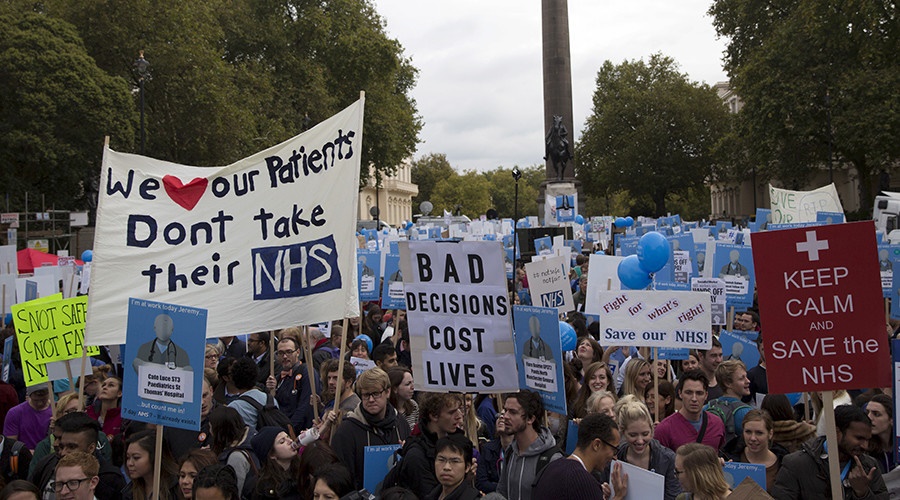19.10.15
Thousands of junior doctors take to the streets in second anti-contract rally
Thousands of junior doctors, their families and other health service personnel protested in central London streets on Saturday (17 October) against the government’s decision to impose a new contract on them by next year.
The rally at Waterloo Place hoped to serve as a wake-up call to health secretary Jeremy Hunt’s threat to force a new contract onto trainee doctors despite claims that it is unsafe and harmful to both doctors and patients.
Dr Johann Malawana, BMA junior doctors committee chair, addressed protesters asking that Hunt stop attacking them and start engaging in reasonable dialogue. He argued that the weekend’s massive campaign was merely the culmination of a longstanding outpouring of anger and frustration from junior doctors ever since Hunt threatened to impose a new contract after the BMA pulled out of the negotiations.
He said: “If they [ministers] thought that junior doctors would simply accept their threat of imposition, they have been proved very wrong.
“The health secretary has accused junior doctors of misleading the public over the impact of his changes, yet at the same time he continues to conflate junior doctors’ legitimate concerns and the government’s rhetoric on seven-day services. The truth is that the junior doctor contracts is in no way a barrier to seven-day services, with the vast majority of junior doctors routinely providing care to patients 24/7.
“One former Conservative health minister, previously responsible for the contract negotiations, has said publicly that junior doctors are already delivering a seven-day service ‘week in week out, day in day out, looking after patients’ and that they deserve a contract that is ‘fair and properly rewards and looks after the interests of our medical workforce’.”
Malawana acknowledged that Hunt had recently recognised the vital role junior doctors play in the NHS, but said this was at odds with his relentless and extremely damaging rhetoric attacking doctors.
“We have always stated that without the continued threats of imposition and pre-conditions, the BMA would be happy to enter meaningful negotiations. But until the government gives junior doctors the reasonable assurances they are demanding, we will continue with our course of action,” he continued.
Speaking to the Observer, Malawana also revealed that trainee doctors were preparing to ballot for industrial action in light of frustrations over Hunt’s handling of the situation.
More details of the ballot will be unveiled this week in order to further pressure the health secretary, but any junior doctor who is a member of the association by 23 October will be eligible to take part.

But speaking to BBC Radio 4’s Today programme ahead of the rally, Hunt said that it was incredibly disappointing that the BMA had misrepresented the government’s position.
“It’s caused a huge amount of anger unnecessarily. We don’t want to cut the pay going to junior doctors. We do want to change the pay structures that force hospitals to roster three times less medical cover at weekends as they do in weeks.”
He added that providing weeklong care of equal quality to all patients was what everyone wanted, which is why the BMA needed to sit “round the table and discuss with the government how we do the right thing of the NHS and patients”.
Earlier in October, NHS Providers urged junior doctors to respond “positively and collaboratively” to Hunt’s pledge to develop the details of the new contract in order to ensure that the great majority of trainees were at least as well paid as they are now.
But the BMA has emphasised that it will only re-enter negotiations if Hunt’s threat to impose the contract.
NHE has put together an exclusive detailed timeline of the longstanding dispute between the government and junior doctors dating back to 2013, including all key events in the contract row.
(Images c. Neil Hall/Reuters)